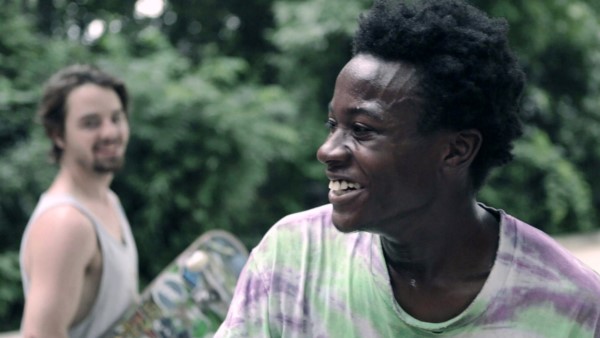Minding the Gap Review

Bing Lu’s “Minding the Gap” is more than a sleek skateboarding doc that dives into alternative culture; in fact, it might not even be that at all. What probably began as an exercise in Lu turning the camera on himself and his friends blossomed into portrait of middle-American working-class life, specifically three young men who process hardship and deep emotional wounds best while on a skateboard.
Lu, his friend Zack and their younger friend, Kiere are the main subjects of the story, each passionate skaters trying to get by in their hometown of Rockford, Illinois. Piecing together that skating is symptomatic of something deeper between them, Lu decides to probe Zack and Kiere, gently pushing them toward emotional honesty. What he uncovers is a troubling and all-too-true reality that each of them is enduring, a revelation that transforms the entire viewing experience.
The film is full of these subtle, unexpected surprises. Most documentaries make an assertion or hypothesis that the filmmakers explore in depth, and the stories have an intuitive arc to them. “Minding the Gap” takes place over the course of many years and even includes footage from several years earlier, but that’s not immediately apparent. Our perception of the story, along with its scope and impact, changes the longer the movie’s timeline gets. Essentially, Lu’s patience with his story pays off tremendously; letting these characters’ lives play out deepens and enriches everything.
Time factors in the most in Zack’s tumultuous relationship with Nina. She’s pregnant when we meet them, and as their baby boy, Elliott, begins to grow, their lives and their relationship struggles take on a different urgency. Lu captures lots of critical moments in their journey (usually from either his or her perspective separately), which proves vital to the film because so much of the rest is reflective, specifically on Lu and Kiere’s childhoods. The Zack-Nina relationship is, in effect, a microcosm of so many of the obstacles, struggles and themes of all the characters’ lives.
As personal as the film gets, however, it’s also a technical accomplishment. Lu conveys not just the cool, but also the zen of skateboarding that these characters experience through excellent action shots. He and co-editor Joshua Altman nail those movement sequences on top of powerfully stitching together so many different moments and stories. The film sometimes gets so deep into the characters’ emotional lives that skateboarding feels irrelevant, but the extent to which skateboarding provides escape and “therapy” as one character puts it sinks completely in by the end.
Here are these men who will gladly risk every limb to land a trick yet are reticent to take emotional risks. Only Lu’s close relationship with these subjects allows them to open up. His own sense of an imperative to ask them the tough, honest questions and blur his role between filmmaker and friend/relative creates the film’s most powerful material. At a few points, subjects ask him if they should pretend he’s not there or talk to him like they’re having a conversation, suggesting the strong influence of his dual-role in his film.
Yet “Minding the Gap” is far from self-centered and self-serving. Rather, it is indicative of how some stories can only be collected and recorded by the people who live them. We’ll need more brave filmmakers like Lu in order to discover these stories and let their truth find the eyes, ears and hearts of those who identify with and need them most.
4.5/5 Stars
Minding the Gap
Directed by Bing Lu
Starring: Zach Mulligan, Bing Lu, Kiere Johnson




0 Comments
You can be the first one to leave a comment.